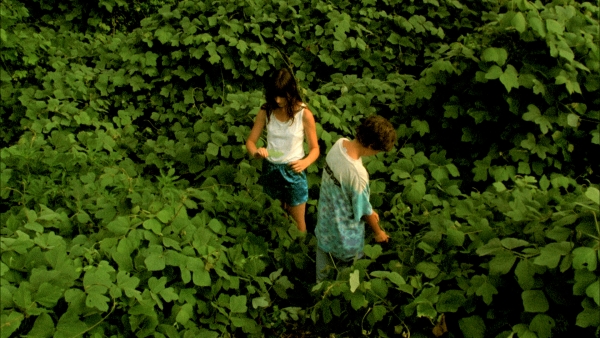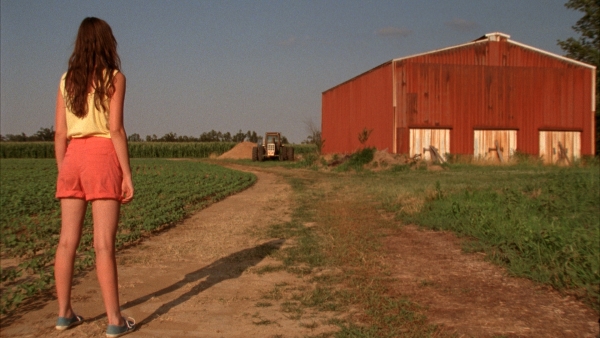

By Kim Voynar Voynar@moviecitynews.com
SIFF Review: Jess + Moss
Every now and again, a filmmaker sets out to do something kind of off-the-wall and experimental, and it ends up working brilliantly. Such is the case with Jess + Moss, an experimental film with a ghost of a story whispering its way through a sumptuous canvas created, as we learned from the director in the post-screening Q&A, almost by happenstance.
The film, very loosely, is a coming-of-age story of sorts about lovely, leggy Jess (Sarah Hagan), who in spite of recently graduating from high school, is still more woman-child than woman, and her 12-year-old second cousin Moss (Austin Vickers). The film loosely follows the things that happen between the two as they play together through lazy summer days on the family tobacco farm, using a dilapidated farmhouse as a clubhouse of sorts where they play with the sort of unfettered freedom that you and I may have enjoyed in our own youth, but which has been largely lost to the children of today’s clean-scrubbed, sanitized, overprotective world.
It’s not much of a story in the traditional storytelling sense of things happening along a neat arc with rigorous plot points; rather, Jeter allows the story to unfold with along the natural, meandering path of summer days and memory: We see very little in the way of adult supervision or intervention as Jess and Moss ride their bikes to an old farmhouse, caving in here and there, water-damaged, but with much of its furnishings and dishes and knick-knacks and such still intact. What a great summer playhouse for a couple of kids to explore and play in, we might think wistfully, longingly, and perhaps somewhere in a corner of our minds as we’re watching the film, our own memories of childhood in summer unfurl and dust off their cobwebs to come out and play.
There is a story weaving things together: Moss asks Jess to tell him over and over again the almost mythical tale of how their parents were best friends who did everything together, and how Jess remembers when Moss was born, and how very much his parents loved him, and how they were killed in a car wreck one rainy night on the way to play a game of Pitch at her parents’ house. Jess’s story is a never-changing mantra of comfort — until the very end, when Jess changes the story abruptly in a bid, it seems, to intentionally create an emotional rift between the cousins.
Meanwhile, Jess’s memories of her own mother, who left some time ago, are largely held together by a couple of cassette tapes on which her mother triesto explain to Jess why she had to leave, and assures her daughter she is just forging a path for Jess to follow and join her some day.
At the Q&A, Jeter explained that the film came about because he and co-cinematographer Will Basanta had a bunch of expired 16MM film stock lying around, and they wanted to use it and see what kind of results they would get. Jeter had been wanting to shoot his family’s Kentucky tobacco farm, where he’d spent many of his own summer days, and the house Jess and Moss play in belonged to Jeter’s great-grandmother and exists pretty much just as they shot it here. He said they initially set out to shoot a short film in a couple days, and ended up shooting enough for a feature in seven.
Jeter said one of the things he was experimenting with was to evoke an idea of “memory” by getting a contrast between images shot on some 30 different stocks, some of which were 25 years old, stored in a variety of conditions. They hoped that some of the slightly damaged stock might give them different contrasts and color saturation that would visually evoke the way some memories fade, while newer stock would evoke more clearly the more important memories that the characters most cling to.
And memory is used in this film almost as a comfort object a growing child might still cling to, even as they grow up and must, eventually, grow away. When we speak of “roots” and “wings,” those roots are the memories created in our child’s mind, that tie us to our past and our family heritage, inexorably, even when we gain the strength to use our wings to move on to other nests. And there are some stunningly beautiful images of memory captured here. Even something as simple as the framing shot of a faded red barn against azure summer sky, or the angle of a shot of Jess and Moss perched atop grain silos, is done with an eye toward capturing something spectacularly on a moving canvas. The appreciation of nature in the images is almost reverant, holy.
There’s a lot of use of voiceover in this film, and normally I am not a fan of voiceover, but here is a rare example where it’s used rather brilliantly, not as cheap exposition, but as another form of evoking memory. Often the snippets of conversation between Jess and Moss feel like droplets of spoken poetry being used to enhance the visuals, the lyrics to the underlying, ever-present melody and rhythm of the images. Both the visual and sound editing are done quite brilliantly.
When Jeter spoke about how the film was actually put together at the Q&A, he spoke of using little in the way of a structured script, and capturing things spontaneously as they were inspired by some bit of natural beauty. Much of the voiceover, he said, was done by him handing a recorder to the two actors while the crew were setting up for a shot, or in other down time.
Jeter further spoke about how once they’d finished shooting everything, since they were shooting on 16MM they didn’t really know what they’d end up with until it was processed, and once that was done he essentially tossed it all over the fence to editor Isaac Hagy and told him to see what kind of story he could find there; a 45 minute rough cut emerged that, Jeter said, became the basic structure of the film that they built on from there.
The repeated visual motif of moss, both in the character’s name and inside countless jars in the old house that have grown, over time, to be miniature terrariums, microcosms of life held captive in a jar, could be said to be evocative of the idea of Jess herself, held captive by the homestead, but longing to break free like her mother before her, while Moss is still content to remain in the comfortably familiar womb of childhood.
So what we have here is an experimental bit of filmmaking, very collaborative in nature, in which the director has created a view of childhood and memory that’s at once deeply personal and universal. No, it’s not some grand philosophical statement in the vein of The Tree of Life, but it is very thoughtful and beautiful and lovely. If Jess + Moss had been created in a more structured way, it would have been a very different (maybe still good, but different) film than the lovely meditation it is now.
It makes me wonder what kind of director Jeter will be, over time, whether he’ll continue to experiment with this kind of loosely structured, organic filmmaking as a style all his own, or if he’ll be a completely different director on his next film. Jeter won a $25,000 award for Jess + Moss at the Dallas International Film Festival in April, following buzzed screenings at Sundance and Berlin, so hopefully he has the incentive to make another film to bring whatever other visions he has to the screen. For now, we can sit back and soak in the glory of the golden Kentucky summer days of Jeter’s childhood through this sweet, sad film.

















A tremendous review of a unique piece of creativity and
what may be the beginning of a “one of a kind” career for Clay Jeter. He is dynamite!! And, he is surrounded by
a terrific support system of a gifted team behind the scenes and two adorable stars, Sarah and Austin. Blessings to all–we look forward to the next Jeter film!
I really liked the cinematography of the film – it converted it in a visual poem , however I found the lack of any real plot development dreading which effectively ruined my experience.